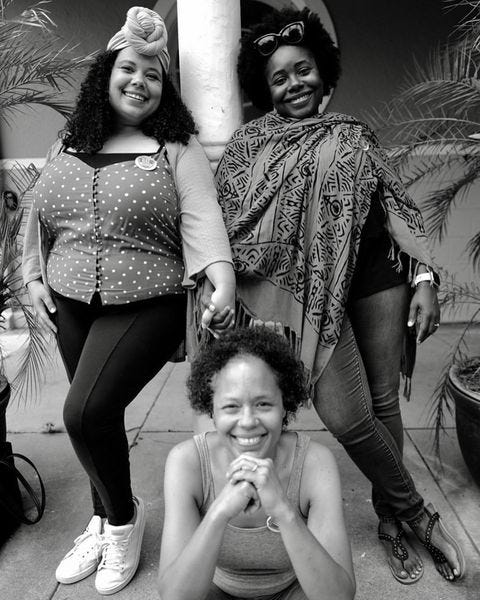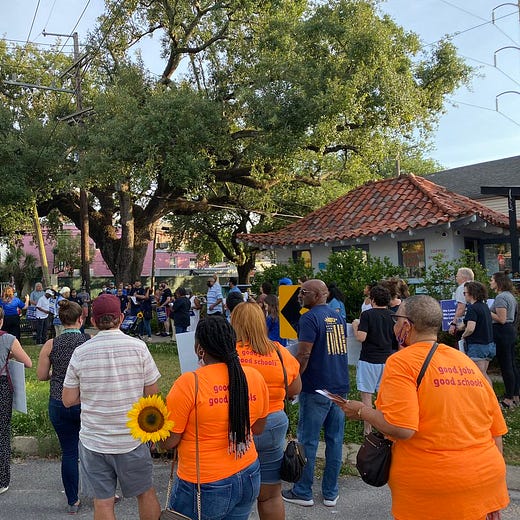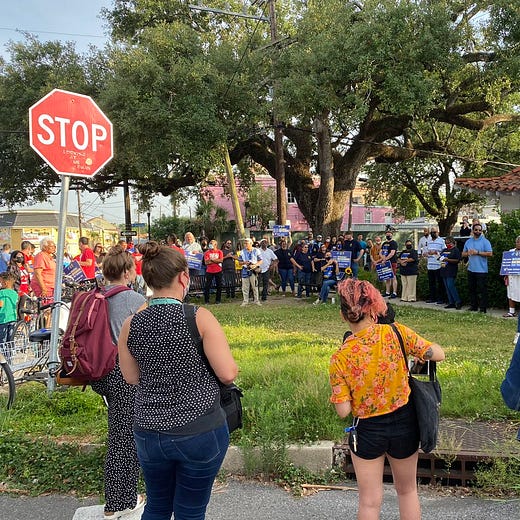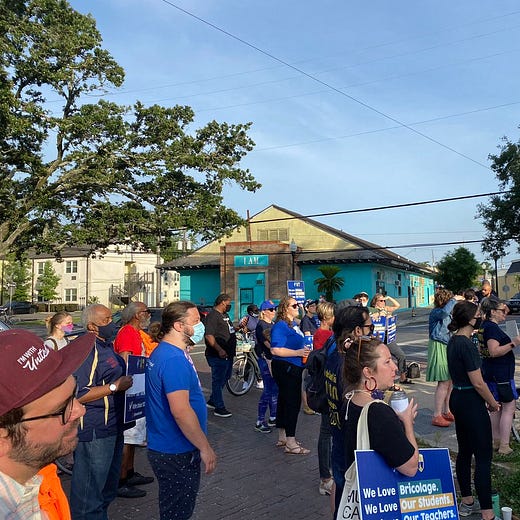The Grassroots Movement to Unionize A New Orleans Charter School
The teachers at Bricolage Academy could get a union today—despite the best efforts of their bosses.
What happens when workers at a self-described anti-racist organization try to unionize? At one New Orleans charter school, Bricolage Academy, the leadership of the school forced a National Labor Relations Board election and has slammed the union in public, portraying it as an astroturfed effort from teachers' unions rather than the organic one organizers say has been building for the past two years.
But as teachers at the school vote on whether to form a union today, the pro-union side is confident of its chances.
"I know that we have the numbers to win. It's just a matter of how much we win by," Brittany Scofield, a member of Bricolage Academy Educators United and a music teacher at the school since 2018, told Discourse Blog. "We want to be as united as possible going into collective bargaining."
Bricolage had a somewhat tumultuous start. It opened in 2013 in a Jewish synagogue and for the next five years jumped around multiple buildings in different parts of the city, "often making do without such luxuries as central air conditioning, closets or ample outdoor space for young learners," according to a New Orleans Times-Picayune feature in 2018.
Bricolage also came of age as the charter movement fully consolidated its grip on New Orleans education. Charter schools have become virtually the only game in town ever since Hurricane Katrina and neoliberal opportunism wiped out the city's existing educational infrastructure; In 2019, New Orleans became the first major American city without any traditional public schools. That same year, a state report graded nearly half of the city's schools as below a "C" standard.
There have also been the sorts of problems of capitalism you'd expect from leaving a public service like education up to the marketplace, such as a restrictive admissions process at some of the city's top schools and closures at some of the lowest-performing and most cash-poor ones, though the bulk of funding for charter schools like Bricolage is provided by the state and local government.
The system also makes for an infinitely harder path for workers at New Orleans schools to form unions, as they're employed by various charter operators—there were dozens in 2019, according to the Lens, a nonprofit news site in New Orleans which has reported on Bricolage's union drive as part of its extensive coverage of education in the city—as opposed to a single district.
Even so, Bricolage is seen as something of a success story. It secured a permanent home after another charter school, John McDonogh High School, fell apart. McDonogh, a formerly traditional school, had been taken over by charter zealot Steve Barr, and had even been featured on an Oprah Winfrey Network reality series whose exploitative depiction of the school as a Dangerous Minds-style hellhole in need of a tough-love savior prompted an outcry. Bricolage won the McDonogh building in a public bid in 2015, and moved in three years later following a controversial $35 million renovation.
The school, which started with three kindergarten classes, now serves nearly 800 children and has grown to the point where it'll offer eighth grade for the first time in the 2021-2022 school year. There is no selective admission, and no academic or financial requirements to attend, according to the school's website; it was one of just four such schools in New Orleans to receive a "C" or better in Louisiana's 2019 report, according to the Lens.
Both teachers and administrators describe Bricolage as a unique school. "We aren't your typical school...and we take great pride in this distinction," Bricolage's recently-departed CEO, Troave' Profice, wrote in a message that still appears on the school's website. "We prioritize student autonomy at an early age, perseverance, creativity and facility. We are an anti-racist school."
"Whereas other charter schools have a more rigid culture that focuses on compliance," Scofield said, "Bricolage focuses more on trauma-informed responses and social, emotional learning. Diversity and equity are a big part of the mission, and the anti-racism too."
Such a place would, in theory, seem like a fairly welcoming environment for a union. And in 2017, the National Labor Relations Board ruled that two charter schools in New Orleans could unionize, a decision upheld by the notoriously conservative Fifth Circuit Court of Appeals in 2018.
Staffers at six New Orleans charter schools have attempted to form a union since Benjamin Franklin High School in 2014. Out of those, two, including Franklin, have been voluntarily recognized, one was voted down (though a smaller group of paraprofessionals voted to join a union at the same time), and another school's workers formed a union, only for the school to lose its charter two years later. Educators at International High School voted for a union in 2016, but the school refused to bargain despite the aforementioned rulings and there's still no collective bargaining agreement, the Lens reported earlier this month.
When Scofield came to the school in 2018, she was a member of the United Teachers of New Orleans (UTNO), but she said that because Bricolage was so much better than her previous school, agitating for a union "just wasn't at the forefront of my mind."
"And then, you know, the cracks started filling in," she said. "And I was like 'Okay, yup—this is still a charter school."
"There are issues as far as accountability for charter schools, because we are governed by unelected boards, and those boards aren't usually made up of wealthy society, people, just like at a nonprofit," Scofield continued. "And a lot of times those people have no experience in education, and they don't really know much about what goes on day to day at the school. They don't know our students, they don't know our schools, they don't go to our classrooms, but they have a lot of authority over the decisions that are made."
Scofield is one of the three founding members of the school's organizing committee, and co-workers like Jasmine Araujo began organizing when Scofield went on maternity leave. The director of diversity, equity, and inclusion at the school, Araujo said she was inspired to start organizing due to the challenges of implementing a program that "made sure students were being taught Black history as much as white history and that the Black staff was enjoying their experience."
Organizing at the school continued after Scofield came back to work from maternity leave. "I organized the lactation room," she chuckled.
But the effort fully picked up steam this school year, Scofield said, when teachers came back to school during the COVID-19 pandemic and were informed that their benefits were going to be cut. "We came back to teach in a pandemic, and they're like, 'Oh by the way—we cut your parental leave by a third, we cut your bereavement leave by a third, we cut your retirement match.'" Workers at the school banded together to stop the cuts to parental and bereavement leave, which Scofield said helped make the case for a union.
"People get galvanized and people realize like, hey, all of our working conditions are at the mercy of this unelected board. And we have no decision-making power," she said. In February, after years of organizing, the union presented a petition signed by more than 80 percent of eligible faculty and staff to school CEO Troave' Profice requesting voluntary recognition.
"The anti-union campaign started immediately," Scofield said. "People were pulled into one-on-ones. Our CEO told us that in an email that she wanted us to withdraw that petition, and then also told us to not be freaked out if you see certain jobs posted, [and that] it has nothing to do with the union petition. In the same email where she said she wanted us to withdraw it. So obviously that scared people."
On March 10, a public meeting of the governing board included a closed-door session with the school's attorneys to discuss the union, according to the Lens. After no response, the union formally filed an NLRB petition on April 20. Four days later, board chair Yvette Jones sent an email to the "Bricolage community," including parents, which was obtained by Discourse Blog. Jones said the email was necessary "given the tenor, tone, and misleading information of UTNO's filing and the messages union organizers are conveying to school staff and others." (Jones did not respond to emails requesting an interview.)
In the email, Jones deployed the usual anti-union arguments—attributing the impetus for unionization to UTNO rather than the workers themselves; arguing that unions at two schools that had successfully unionized didn't attain "meaningful salary adjustments" and that union dues teachers pay at those two schools "depletes their take home pay"; and criticizing the union for not including paraprofessional staff and even managers in the bargaining unit.
"The fact that UTNO wants to unionize only some members of the Bricolage community, speaks volumes about 'unity' and is contrary to our school’s sense of community," Jones wrote.
Jackie James, who's in her first year teaching seventh-grade English and language arts at Bricolage, said one of the challenges of organizing was fighting "this big push to vilify UTNO and paint it as though representatives of UTNO were infiltrating Bricolage and getting teachers to join UTNO without knowing what they were doing."
"We had to constantly reaffirm that it was our decision, that this was us and we're choosing to do this," she said.
At a virtual board meeting earlier this week, Jones called the school's approach to the union effort "a measured one to this important issue," adding, "we did let the process unfold organically." She also encouraged teachers to vote.
Profice went on personal leave earlier this month and later said she wouldn't return to the school, according to the Lens. But before doing so, she spoke out publicly against unionization in an email to the Lens (Profice did not respond to a request for comment on Thursday):
“Installing a union at Bricolage could change that in ways that will be uncertain at best and negative and divisive at worst as demonstrated by how narrowly and intentionally they created the bargaining unit to purposefully exclude certain employees,” she wrote. “Additionally, despite promises from outside union organizers, the union can provide no guarantee that employees will directly benefit from their membership. Under a union, individual school employees will forfeit their independent voice and their ability to be their own best advocate on issues of importance to them.”
In the NLRB election notice, members of the voting unit are defined as "professional employees, including teachers, associate teachers, counselors, and interventionists." Those not eligible to vote include supervisors, managers, guards, and "non-professional employees." (Librarians are able to vote as well, though their eligibility to join the unit has not been determined.)
Organizers told the Times-Picayune this week that they've received "union-busting propaganda" at their homes signed "from Morris Jeff," one of the two schools whose unions were voluntarily recognized. There's also an anti-union Instagram account called "Employees for an Independent Bricolage," which is at least partially run by teachers who oppose the union. The account's posts include a two-part video by 4th-grade special education teacher Jon Palmer.
"I just feel like the best chances for success, for making decisions is with trusting our leadership and maintaining teacher accountability we have now," Palmer says in the video. "I think our best days are ahead of us, and I think our best days are ahead of us without a union."
But when Jones briefly opened up the issue for public comment at the school's board meeting earlier this week, all four people who spoke were in favor of the union, including both teachers and parents. "I think that things go better for students, staff and families when teachers have an active voice in the conversation," said Justin Smith, a 4th-7th grade workshop teacher. "A union makes sense for us to have our voice heard in a formal way at the school."
Asked what she wants if the unionization effort is successful, James had a simple answer. "Teachers work at Bricolage until they are old and wrinkly, and then they retire with their pensions and live the lives of professional integrity that all educators should," she said. "I think that's what everybody wants."
On the morning of the vote, Bricolage workers were joined for a solidarity rally in support of BAE United.
"I hope that our story can help inspire other workers—especially charter school workers—because it's incredibly hard to unionize a charter school," Scofield said. She told Discourse Blog she's also had conversations with colleagues at other schools in the city about the union drive and added, with a laugh: "They want to come work here now."
Update, 12:15 p.m. ET: Bricolage educators voted 42-18 to unionize Friday, according to UTNO. Bricolage is just the fifth school in New Orleans whose employees have successfully organized since Hurricane Katrina, the union said.









